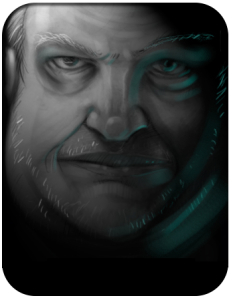DETECTIVE MOXLEY, Part 25: “He Had a Tank”
Oyd Waller stood up behind the square of machined crystal that was his desk. “Explain to me,” he said, growing redder with every word, “why you can’t kill a single, broken-down private detective!”
Seated before him, Miller shifted uncomfortably. “He had a tank,” was all he could offer. “My men weren’t prepared for that.”
“Your men are paid to be prepared!” Waller bellowed. “How many hundreds of thousands has this Moxley already cost us?” Waller went to the window behind his desk, turning his back on Miller, and briefly stared down at the streets of Hongkongtown. They were high enough up that even surveillance drones rarely passed at eye level. The one-way panes of the office tower were nonetheless treated and shielded to prevent eavesdropping. The Baxter-Derrill Medicorp tower was the third-highest structure on the Atoll. Only the Peak Tower and City Hall were taller.
“I took,” said Miller, careful to keep his tone neutral, “those actions that I thought necessary to gain control of the situation.”
Waller snorted. Folding his hands behind his back, he continued to stare at the streets far below. Without looking at Miller, he said, “Moxley’s interference has raised significant concern in Research and Development about the viability the units. If they’re asking questions, it’s only a matter of time before the military reps start asking questions. Do I have to say it? If the military pulls our funding, they’re going to want it back. Our financing was contingent on delivering to them a viable replacement for combat Ogs.”
“We successfully took out Theopolis without suspicion,” said Miller. “He was only the latest in a string of successes. I don’t see how the units have failed to demonstrate viability,”
“You don’t? How many units has this Moxley destroyed by himself?”
“He’s… atypical,” said Miller.
“You assured me he was nothing. You assured me he wouldn’t be a problem. But not only can’t our SAIDs kill him, but your paid mercenaries can’t do it either.”
“He had a tank!” Miller shouted, forgetting himself. When Waller turned to fix him with a glare, Miller held up a hand. “I’m sorry, sir. It’s just that a squad of armed men should have been sufficient to kill one individual in a ground car. We had no way of knowing the car was armored or that it was equipped with flamethrowers. Flamethrowers, sir! I don’t believe any rational person could be expected to anticipate that.”
“That is what I pay you to do,” said Waller. He turned once more to the window, hands still clasped behind his back. “But forget Moxley for a moment. It cost us a considerable sum in bribes to cover up that business in the Lion Arc today. Please explain to be how the two SAIDs you put on Moxley switched from infiltration and assassination mode to overt combat. We can’t have them running amok, Miller. Too much publicity. And even in combat mode they were destroyed. How is that possible?”
“They weren’t armed for full combat,” said Miller. “As to why the two units assigned to double the Human Services agents went to full combat, I have a theory. The units—”
“SAIDs,” Waller broke in. “Synthetic, Artificial Intelligent Devices. Marketing wants us to start using the term. Branding, they said.”
“The… SAIDs… are programmed to make decisions based on available inputs,” Miller said, brow furrowing. “A unit typically will keep its subject alive, while in infiltration mode, if it believes that subject could be a source of potentially useful intelligence, or if the subject could prove to be of value as a hostage or negotiation tool in the future. The unit kills the subject it is doubling only if it judges that subject has no future or intrinsic value.”
“So they do whatever the hell they want?”
“That’s one way to look at it,” said Miller. “Remember, the fact that the SAIDs can regenerate and self-repair, provided the central processor isn’t damaged, enables them to recover even after extended downtimes. That requires tremendous computing power. Building all of that into an AI lattice is bound to produce some unpredictability.”
“Unpredictable is hardly the word,” said Waller. “We now have multiple units unaccounted for. We should probably write off the two Moxley blew up in the Lion Arc. That leaves the two you detailed to Lindsey’s house. And the unit you put on Neiring.”
“I’m not convinced the one assigned to Ray Neiring was destroyed,” said Miller. “I think it may have been damaged. Or it may have gone to covert mode and disassembled itself before hiding its components. They do that if they judge discovery to be imminent.”
“Every time we lose a unit, we’re adding zeros to the red ink,” said Waller. “Just the cost of the incinerator guns alone is of concern at this point. Are you still handing those out like candy? In the future, I don’t want you giving incinerators to every street thug you think can accomplish your dirty work for you.”
“There are times when plausible deniability requires the use of local assets,” said Miller.
“Don’t argue with me, damn you,” said Waller. “Fix the problem. Obviously neither the SAIDs nor your hired thugs are up to the task of putting Moxley out of our misery. You’re going to have to take more drastic measures.”
“Are you sure, sir?”
“I’m sure.”
“All right,” said Miller. “Once I use our Sleeper assets, it will take time to cultivate more.”
Waller actually laughed. “Isn’t that what we’re doing? Cultivating Sleepers? Just do it. Use whatever resources you must as long as it doesn’t dig us deeper into the financial hole you’ve made. If we can’t kill Moxley, we’ll warn him off by hurting the people he cares about. I assume you can figure out who that should be?”
“I have a file on him,” said Miller. “I know everywhere he goes. The tracker we put on his car stopped working after his car was rammed, but I know where he’s been recently. It’s all I’ll need.”
“Good,” said Waller. “Go do it. I don’t want to see you again until you can tell me Moxley is out of the picture.”
“Yes, sir.”
* * *
Once more seated behind his desk, Oyd Waller touched a control surface on the desk’s crystal expanse. The window pane behind him darkened as the outside world was blotted out. Touching another stud brought up a concealed screen. Waller placed his palm against this and spoke a few words of code.
Ten seconds later, his call was answered.
“Yes,” said the wet, lilting voice.
Waller suppressed his horror. “I got your message,” he said. “I apologize for not calling sooner. There were matters to attend to.”
“Did these matters concern the delays in Sleep production?” asked the voice. “My plan is tightly scheduled, Mister Waller. If the development of your facilities, and the beings to staff them, does not go as you promised, my timetable will be dealt irreparable damage. That is unacceptable. If you fail, I will have no choice but to deal with the issue personally. You may wake up with the blade of a Squeeze in your throat.”
“Now just a moment—”
“Or you may wake up to find your home silent,” said the voice, “and your family dismembered in their beds. I have given you a gift, Mister Waller. My technology made it possible for your company’s vision to come to fruition. We need each other. But the second we don’t, please harbor no illusions that you will continue to live your life unmolested.”
“Bhavik, I swear that I will deliver as promised.”
“That is good, Mister Waller. Swear. It cannot hurt.” The screen went blank.
Oyd Waller slumped in his chair, wondering how he had come to make a bargain with this particular devil.


